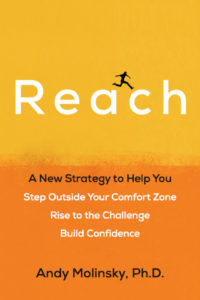The material in this post is adapted from my new book Reach: A New Strategy to Help You Step Outside Your Comfort Zone, Rise to the Challenge, and Build Confidence (Penguin Random House).
We often feel helpless in situations outside our comfort zone. But we actually have more power than we think. By making minor, but meaningful “tweaks” in how we act, we can decrease stress and increase confidence.
For example, if you’re terrified of speaking up in meetings, you might learn a few catch phrases to get people’s attention, such as: “Have we thought about this?” or “Here’s another idea we might consider.” If you know your tendency is to apologize, even when it’s not necessary, you might purposefully remember not to say “I’m sorry” and instead to substitute another expression.
You might also consider tweaking your non-verbal behavior. For example, when mustering up the courage to speak up at a meeting, you might stand up tall, lean forward, with your hands slightly at your side, and plant your hands firmly on the desk. If you’re about to deliver an assertive message to a colleague, you might walk the hallway for a moment, like a busy, confident executive, and then continue your stride right into the person’s office.
Timing is another variable that you often have more control of than you think. If you have to deliver bad news and know you’ll be stressed, choose a time when you feel most capable – after a long run, or sandwiched between activities you enjoy and that give you energy. Or if you dread networking, arrive early before the throng arrives, so you can speak in a less stressful atmosphere to build confidence.
Finally, sometimes you might even have power to craft the context or setting to your liking. For example, if you’re uncomfortable with giving a formal speech, you might consider doing a Q&A session, which, for some people, is more comfortable than delivering a formal speech. Or, if you’re like the famous satirist Mark Twain, you might even populate the audience with “plants” you know will support you with applause and laugh at your jokes. This is what Twain wrote about his tactics: “I had got a number of friends of mine, stalwart men, to sprinkle themselves through the audience armed with big clubs. Every time I said anything they could possibly guess I intended to be funny, they were to pound those clubs on the floor. ”
In the end, there’s no one-size-fits-all approach to stepping outside your comfort zone. But you often have more leeway than you think to turn a difficult situation into something you can handle.
Originally posted on Inc.
AVAILABLE NOW
Reach A New Strategy to Help You Step Outside Your Comfort Zone
According to Andy Molinsky, an expert on behavior in the business world, there are five key challenges underlying our avoidance tendencies: authenticity, competence, resentment, likability and morality. Does the new behavior you’re attempting feel authentic to you? Is it the right thing to do? Answering these questions will help identify the “gap” in our behavioral style that we can then bridge by using the three Cs: Clarity, Conviction, and Customization. Perhaps most interesting, Molinsky has discovered that many people who confront what they were avoiding come to realize that they actually enjoy it, and can even be good at it.
